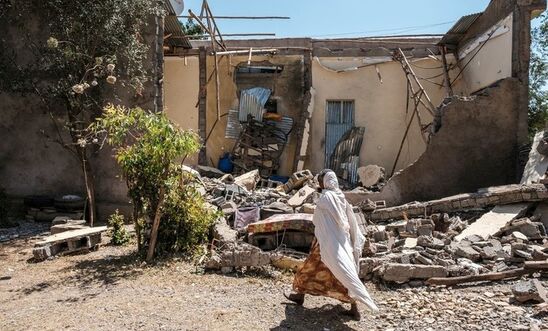
Press releases
Ethiopia: Tigrayans targeted in fresh wave of ethnically motivated detentions in Addis Ababa

Arrests have intensified since government declared a state of emergency 10 days ago
The state of emergency allows authorities to arrest and detain anyone without a warrant if there is ‘reasonable suspicion’ of cooperation with ‘terrorist groups’
Most detainees are being held without charge or access to a lawyer
‘The government must immediately… amend the state of emergency proclamation to bring it in line with international law’ – Deprose Muchena
Security forces in the Ethiopian capital, Addis Ababa, have targeted Tigrayans - including children and the elderly - with arbitrary arrests and mass detentions as part of an escalating crackdown, Amnesty International said today.
The arrests have intensified since the government declared a state of emergency 10 days ago as fighters from the Tigray People’s Liberation Front (TPLF) took control of strategic towns in Amhara region some 400 km from Addis Ababa.
Arrests are conducted through house-to-house searches by security forces with support from vigilante groups who check the IDs of people on the street. Detainees, including civil servants, Orthodox priests and a lawyer are being held in youth centres and other informal detention centres across Addis Ababa because police stations are overflowing. Most detainees are being held without charge or access to a lawyer.
Sarah Jackson, Amnesty International’s Deputy Regional Director for East Africa, said:
“These mass arrests have instilled such a climate of fear that the Tigrayans Amnesty International has spoken to are scared they could be rounded up any time.
“Those currently locked up have not been charged or brought before a court and many have been targeted purely on the basis of their ethnicity.
“The authorities must ensure that families are informed of the whereabouts and status of all detainees and that anyone deprived of their liberty has access to lawyers and family members without delay.
“The Ethiopian government must immediately end ethnically motivated arbitrary arrests and amend the state of emergency proclamation to bring it in line with international law.”
State of emergency
The government declared a state of emergency on 2 November, which was adopted by parliament on 4 November. The state of emergency allows the authorities to arrest and detain anyone without a warrant if there is “reasonable suspicion” of cooperation with “terrorist groups”, and to detain them without judicial review for as long as the proclamation is in place, currently for six months. Some of the measures violate international human rights law, which prohibits arbitrary detention and discrimination in all circumstances.
Amnesty has interviewed eight people - families, friends and lawyers of detainees - who have reported seeing hundreds of Tigrayans detained in six different locations. While it is currently impossible to establish the exact number of detainees, they number hundreds and potentially thousands.
A few family members and friends have had limited and irregular access to detainees. However, many have been denied access to a lawyer. Moreover, interviewees told Amnesty that the police have transferred some of the detainees to places on the outskirts of Addis Ababa.
Two Tigrayan lawyers interviewed by Amnesty said that they were expecting a knock at the door at any time by security forces, and had their bags packed with a spare set of clothes.
The United Nations has announced that its staff members are among those arrested in Addis Ababa in addition to 72 UN truck drivers arrested in Semera, Afar.
Since the conflict started a year ago between the TPLF and federal government forces, thousands of people have been killed and more than 2 million forced from their homes.
Parties to the conflict have been responsible for war crimes and horrific human rights abuses including widespread rape and sexual violence and massacres of unarmed civilians.